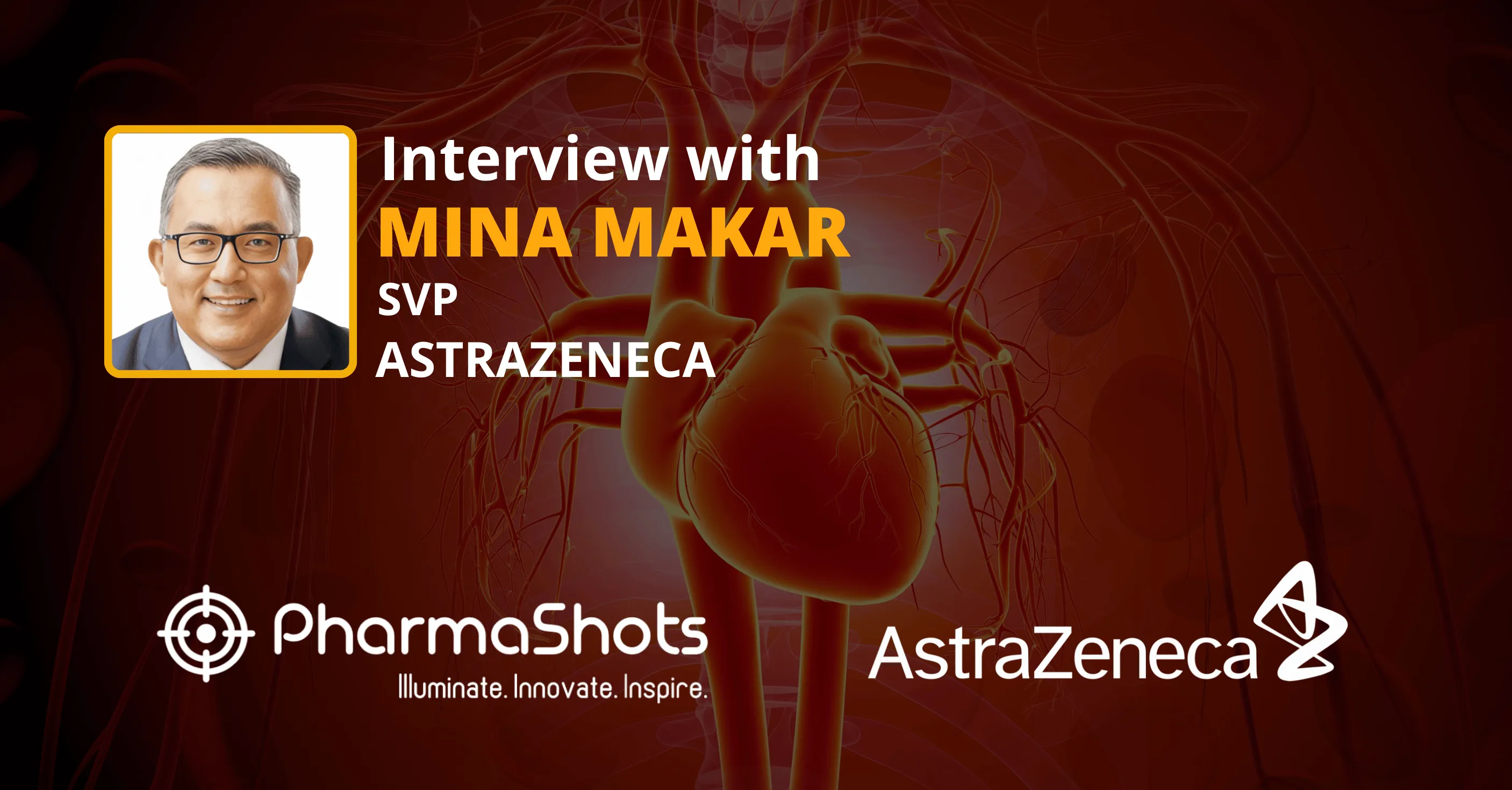
PharmaShots Interview: AstraZeneca's Global Medicine Leader John Houghton Shares Insights on Roxadustat in Treating Patients with Anemia Due to CKD at ASN 2019
AstraZeneca presented P-III data of Roxadustat along with unprecedented 41 abstracts from its renal portfolio at American Society of Nephrology Kidney Week 2019, demonstrating its commitment to advancing the care of Chronic Kidney Diseases (CKD) and its complications, affecting millions of people across the globe.
On Nov 12, 2019 in an interview with PharmaShots, John Houghton the Global Medicine Leader at AstraZeneca shares details and highlights of Roxadustat, ASN data and presented other details of the therapy along with the advancement of AstraZeneca in Nephrology.
The interview with John Houghton emphasizes that Roxadustat is a drug with a unique mechanism of action inhibiting hypoxia-inducible factor prolyl hydroxylase and is the first therapy introduced to the market with the novel mechanism. Anemia is prevalent in patients with CKD affecting 200M+ patients across the globe. AstraZeneca introduces a new treatment option for patients living with CKD, that have been waiting for three decades for new advancements. AstraZeneca, FibroGen and Astellas together evaluated Roxadustat in 9,000+ patients in P-III global program which includes OLYMPUS, ALPS and ANDES study evaluated Roxadustat vs PBO in Non-Dialysis Dependent (NDD) patients and ROCKIES, SIERRAS and HIMALAYAS evaluated Roxadustat vs Epoetin alfa in Dialysis Dependent (DD) patients.
Tuba: Can you discuss the working of Roxadustat and why this is important for CKD patients?
John: The unique mechanism of action, is the most natural approach to treat anemia by mimicking the body's natural response to hypoxia. Roxadustat is a hypoxia-inducible factor prolyl hydroxylase inhibitor, promoting erythropoiesis by increasing the endogenous production of erythropoietin thus improving iron regulation and overcome the negative impact of inflammation on hemoglobin synthesis and RBCs production by downregulating hepcidin. Administration of Roxadustat induces coordinated erythropoiesis, increase in RBC count while maintaining plasma erythropoietin levels within the physiological range in Non-Dialysis dependent, Dialysis Dependent CKD patients.
'Roxadustat utilizes a natural approach to treat anemia as it mimics the body's natural response to hypoxia by inhibiting hypoxia-inducible factor prolyl hydroxylase inhibitor and is the first drug in the marketplace with this unique mechanism of action'
Tuba: Can you highlight the Roxadustat's data at the American Society of Nephrology 2019 and the significance of its findings?
John: On the first day of ASN19, (Nov 07, 2019) we presented the results of P-III OLYMPUS and ROCKIES studies (the two AstraZeneca sponsored studies, part of P-III global clinical program).
The P-III OLYMPUS study involves assessing Roxadustat vs PBO in 2,781 NDD patients in a ratio (1:1) with anemia from CKD stages 3, 4 and 5 across 26 countries. The study demonstrated improvement in Hb levels with a mean increase of 1.75g/dL vs 0.40g/dL. Roxadustat also improves Hb levels in a subgroup of patients with elevated high-sensitivity C-reactive protein (hsCRP), a protein found in blood increases when inflammation is present. It demonstrated mean increase of 1.73 g/dL vs 0.62g/dL.
The P-III ROCKIES study assessed Roxadustat vs Epoetin alfa in 2,133 DD-CKD patients in a ratio (1:1) with anemia across 18 countries. The study demonstrated significant improvement in Hb levels with a mean increase of 0.77g/dL vs 0.68g/dL and an improvement in Hb levels in patients with elevated hsCRP levels 0.80g/dL vs 0.59g/dL.
On the second day, Nov 08, 2019, we presented pooled efficacy and CardioVascular safety results of DD-CKD and NDD-CKD patients from our global studies in the oral late-breaking abstract session High-Impact Clinical Trial at ASN.
In a pooled analysis, Roxadustat showed positive efficacy with no increase in CV risk. The pooled efficacy analyses in the NDD population showed Roxadustat was superior to PBO, the risk of MACE, MACE+ and all-cause mortality was comparable to PBO.
In DD patients, Roxadustat had a lower risk of MACE+ and no increased risk of MACE or all-cause mortality compared to epoetin alfa.
In Incident dialysis (ID) patients, defined as patients who have been on dialysis for =4mos., Roxadustat had a lower risk of MACE & MACE+ and showed a trend towards a lower risk of all-cause mortality relative to epoetin alfa.
Overall, we presented a strong result of Roxadustat at ASN 2019.
Tuba: In what way Roxadustat is different from other Anti-Anemic drugs. As Takeda has recalled its product Omontys (Peginesatide) due to hypersensitivity reactions. Are there any such complications with Roxadustat?
John: Takeda's Omontys (peginesatide) has a different mechanism of action to Roxadust, so I can't comment on why & why not it happened to Takeda's Omontys, all I can comment on Roxadustat is based on the novel mechanism as it promotes erythropoiesis by inhibiting HIF-PHI as earlier discussed. We have good safety and efficacy results which we can use for approval. We have not seen any hypersensitivity reactions during the trials but there always patients that could be hypersensitive to any product or even PBO but there is no sign of any hypersensitivity reactions with Roxadustat till date.
Tuba: What is the timeframe in which AstraZeneca is going to work with the Regulatory Agency of India for Roxadustat?
John: We have already connected with the Indian regulatory agencies, not only about the US program but also for the China program. We plan to submit a regulatory filing in the US which is anticipated in the year-end 2019. After this, we will switch to regulatory submission in other countries across the globe including India. The pleasing thing we have 300+ patients in the program for India so we met the requirement to a significant number of patients and Indian authorities are pleased with it.
Tuba: How many patients worldwide are impacted by chronic kidney disease and its complications, like Anemia?
John: There are approximately 200+M patients worldwide affected with CKD and about 40M patients are suffering in the US, half of the million patients across the EU, China is dialysis-dependent and 98% of patients are also anemic. 4M patients in NDD are in stage 4&3 CKD requiring anemia treatment. Most patients undergoing dialysis are treated for anemia and less to non-dialysis patients.
We hope with our efficacy and safety data, we can impress the US FDA to approve our drug in the US. Facts leading to kidney diseases are diabetes, obesity, hypertension. Unfortunately, these diseases are epidemic across the globe and if these increases, there is an automatic increase in kidney disease.
Tuba: How will Roxadustat potentially change the way patients are treated?
John: DD patients are going for dialysis in clinics and receiving therapies three times a week and in NDD patients, the only competition is other therapies are formulated as injectable while Roxadustat is an oral preparation so Roxadustat is more compatible to the patients.
Moreover, we are providing efficacy in all populations whether DD, NDD or patients with inflammation and we have no cardiovascular risks. So, I can say that Roxadustat will become a nephrologist choice when it comes to treating all kinds of patients suffering from anemia.
'Roxadustat will become a nephrologist choice when it comes to treating all kind of patients suffering from anemia'
Tuba: Why AstraZeneca is so committed to helping to advance the care of chronic kidney diseases and its complications for patients?
John: There has been no innovation in the treatment of chronic kidney disease from the last 30yrs. So, we feel there is a big opportunity to help patients across the globe by introducing Roxadustat in the market to meet the unmet medical needs of CKD patients.
Additionally, we have Lokelma (sodium zirconium cyclosilicate) for hyperkalemia, which is again a big problem in renal patients, Farxiga (dapagliflozin) for the prevention of chronic kidney disease.
We have recognized this as an opportunity for us to take up innovative science and providing therapies for treating CKD. We are involved in a lot of research regarding renal disease to help patients suffering from chronic kidney disease.
About John Houghton:
John Houghton is a global medicine leader at AstraZeneca and is responsible for the strategic leadership of the cross-functional Global Product Team, to ensure the successful development and commercialization of a molecule in late-stage studies. He has joined AstraZeneca in 2015 after working in the renal sector for almost a decade. He takes one of his previous company public on the NYSE which is a standout achievement.
Click here, Click here to read the related news | Image: Blog- Dana-Farber Cancer Institute
Tags

This content piece was prepared by our former Senior Editor. She had expertise in life science research and was an avid reader. For any query reach out to us at connect@pharmashots.com














